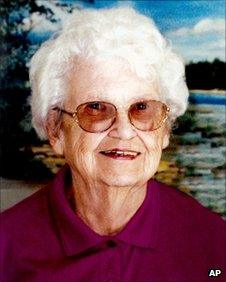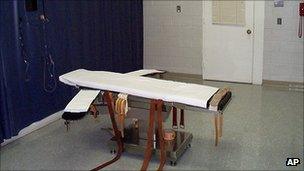Virginia executes Jerry Jackson amid death-drug row
- Published

Jerry Jackson was the 31st prisoner put to death in the US this year
The US state of Virginia has executed a convicted murderer and rapist by lethal injection, despite objections from the drug manufacturer.
Jerry Jackson, 30, was put to death on Thursday evening for the murder of 88-year-old Ruth Phillips.
A shortage of drugs used in past US executions has forced Virginia authorities to rely on an epilepsy drug manufactured by Danish firm Lundbeck.
Lundbeck has said it opposes the "distressing misuse" of its product.
Asked if he had any last words, Jackson shook his head and said "no", reports the Associated Press news agency.
Difficulty obtaining drugs
The drugs that were used to execute Jackson at the Greensville Correction Center in Jarrat, Virginia, were obtained before Lundbeck imposed strict controls on the distribution of pentobarbital, a drug used to treat severe epilepsy.

Jackson raped and murdered Ruth Phillips during an attempted burglary
The company has strongly objected to its product's use in capital punishment, and has restricted distribution in an attempt to keep it out of prison death chambers.
"We're in the business to improve people's lives, so the use of pentobarbital to end people's lives contradicts everything that we're in business to do," Matt Flesch, a US spokesman for Lundbeck, told the BBC.
Jackson was convicted and condemned to death in 2002 on two counts of capital murder, rape and other charges relating to the death of Ms Phillips.
Prosecutors said he climbed in her bathroom window during an attempted burglary.
After she awoke and confronted him, he sexually assaulted and killed her.
His execution came amid a global effort by drug manufacturers to prevent their products from being used in US executions - whether for moral, regulatory or public relations concerns.
Amid the difficulty obtaining execution drugs, US states have had to experiment with different ways to kill prisoners without violating the US constitution's bar on "cruel and unusual punishments", analysts say.
Virginia, like many of the 34 out of 50 US states which allows capital punishment, uses a "cocktail" of three drugs to execute condemned prisoners.
If all goes according to plan, the first drug renders the prisoner unconscious, a second paralyses the prisoner (thus masking signs the first drug worked or did not work) and a third drug stops the heart.
"A lot hinges on the first drug," Richard Dieter, executive director of the Death Penalty Information Center, a research organisation, told the BBC.
"It causes unconsciousness, and if that doesn't work well, the next drugs are very painful."
Epilepsy fight
For years, the states used a drug called sodium thiopental in the first stage, but in 2010 the drug's only US manufacturer, Hospira, announced it was halting production.

The execution was held at Greensville Correction Center
Some US states turned to Dream Pharma, a British firm operating in Acton, West London, for sodium thiopental, until a ban on exports was imposed in December 2010.
Amid trouble obtaining sodium thiopental, the states this year have turned to pentobarbital.
So far in 2011, US states have executed 23 prisoners using that drug, prompting strong condemnation from Lundbeck.
While the drug, sold under the brand name Nembutal, comprises less than 1% of the company's sales, Lundbeck said it declined to stop production because doctors it had surveyed said they would have trouble treating severe epilepsy without it.
But the company last month announced restrictions on the drug's distribution in an effort to keep it from being shipped to prisons in US states that practise capital punishment.
Under that programme, Lundbeck will review orders for pentobarbital and deny them to prisons in capital punishment states.
Purchasers will have to sign a form affirming the drug is for their own use and will not be used for capital punishment and that they will not re-distribute the drug without the company's approval.
"While the company has never sold the product directly to prisons and therefore can't make guarantees, we are confident that our new distribution program will play a substantial role in restricting prisons' access to Nembutal for misuse as part of lethal injection," chief executive Ulf Wiinberg said.
The company has also sent letters to 16 states that have used or have said they would use pentobarbital in lethal injection expressing their opposition and concern, Mr Flesch said.
- Published24 January 2011